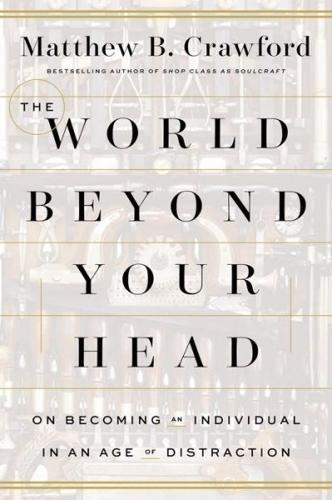
The World Beyond Your Head: On Becoming an Individual in an Age of Distraction
by
Matthew B. Crawford
Published 29 Mar 2015
And if they can identify with the CEO, they will be less likely to feel themselves in an antagonistic relation to those who manage the appropriation of their surplus labor value on behalf of Chinese shareholders. 7. Jaron Lanier, “Digital Maoism: The Hazards of the New Online Collectivism,” Edge, May 29, 2006, available at http://edge.org/conversation/digital-maoism-the-hazards-of-the-new-online-collectivism. 13. THE ORGAN MAKERS’ SHOP 1. I imagine the appeal of this image may have something to do with the fact that it allows the venture capitalists who hang around Silicon Valley to view themselves in a certain cultural role, as midwives to the new.
…
In countless little ways, any single one of which seems trivial, this liberal arts college is unthinkingly repeating bits of Silicon Valley ideology that would seem to undermine the rationale for studying the liberal arts. The university has become “the brilliant ally of its own gravediggers,” to borrow a phrase from Milan Kundera.6 Jaron Lanier criticizes what he calls “digital Maoism,” a “new online collectivism” that shows up, for example, in the way Wikipedia is regarded and used, and is the guiding spirit of firms such as Google as well. The analogy with Maoism is quite apt and precise. The ideologists of the Web have always been antielitists, eager to brush the “gatekeepers” of knowledge into the dustbin of history.
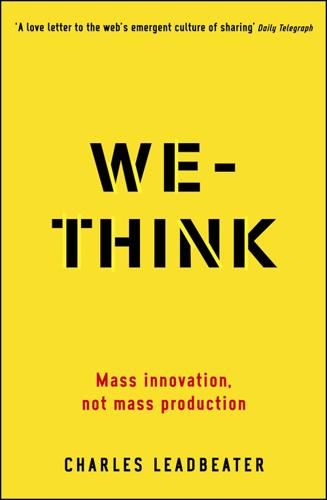
We-Think: Mass Innovation, Not Mass Production
by
Charles Leadbeater
Published 9 Dec 2010
Available from http:// www.msnbc.msn.com/id/12015774/site/newsweek 16 Fred Turner, From Counterculture to Cyberculture (Chicago, IL/London: University of Chicago Press, 2006) 17 Patrice Flichy, The Internet Imaginaire (Cambridge, MA: MIT Press, 2007) 18 Charles Leadbeater, ‘The DIY State’, Prospect 130, January 2007 19 Fred Turner, op. cit. 20 John Markoff, What the Dormouse Said: How the Sixties Counterculture Shaped the Personal Computer Industry (Penguin, 2006) 21 Patrice Flichy, The Internet Imaginaire (Cambridge, MA: MIT Press, 2007) 22 Jonathan Lethem, ‘The Ecstasy of Influence’, Harper’s Magazine, February 2007 23 Garrett Hardin, ‘The Tragedy of the Commons’, Science 162 (1968), pp. 1243–48 24 Elenor Ostrom, Governing the Commons (Cambridge University Press, 1990) 25 Lawrence Lessig, Code and Other Laws of Cyberspace (New York, NY: Basic Books, 1999) and Free Culture (New York, NY: Penguin Press, 2004) 26 Melvyn Bragg, The Routes of English (BBC Factual and Learning, 2000); Melvyn Bragg, The Adventure of English (Hodder & Stoughton Ltd, 2003) 27 Jonathan Lethem, ‘The Ecstasy of Influence’, Harper’s Magazine, February 2007 28 Cory Doctorow et al., ‘On “Digital Maoism: The Hazards of the New Online Collectivism” By Jaron Lanier’, Edge (2006). http://www.edge.org/discourse/digital_ maoism.html 29 Paul A. David, ‘From Keeping “Nature’s Secrets” to the Institutionalization of “Open Science”‘, in Rishab Aiyer Ghosh (Ed.), Code (Cambridge, MA/London: MIT Press, 2005) 30 Alessandro Nuvolari, ‘Open Source Software Development: Some Historical Perspectives’, Eindhoven Centre for Innovation Studies Working Paper 03.01 (2003); Koen Frenken and Alessandro Nuvolari, ‘The Early Development of the Steam Engine: An Evolutionary Interpretation Using Complexity Theory’, Eindhoven Centre for Innovation Studies Working Paper 03.15 (2003) Chapter 3 1 Andrew Brown, In the Beginning Was the Worm (Pocket Books, 2003) 2 Eric S.
…
., 80 Years of Thinking at the Phillips Natuurkundig Laboratorium 1914–1994 (Amsterdam: Pallas, 2005) DiBona, Chris, Danese Cooper and Mark Stone (Eds), Open Sources 2.0 (O’Reilly, 2006) DiBona, Chris, Sam Ockman and Mark Stone (Eds), Open Sources: Voices from the Open Source Revolution (O’Reilly, 1999) Di Maggio, Paul (Ed.), The Twenty-first-Century Firm (Princeton University Press, 2001) Doctorow, Cory, et al. ‘On “Digital Maoism: The Hazards of the New Online Collectivism” By Jaron Lanier’, Edge, (2006). See http://www.edge.org/discourse/digital_ maoism.html Dodgson, Mark, David Gann and Ammon Salter, Think, Play, Do: Technology, Innovation and Organization (Oxford University Press, 2005) Dodson, Sean, ‘Show and Tell Online’, Guardian, 3 February 2006 Dravis, Paul, Open Source Software: Perspectives for Development (Washington, DC: InfoDev, 2003) Ducheneaut, Nicolas, Nicholas Yee, Eric Nickell and Robert J.
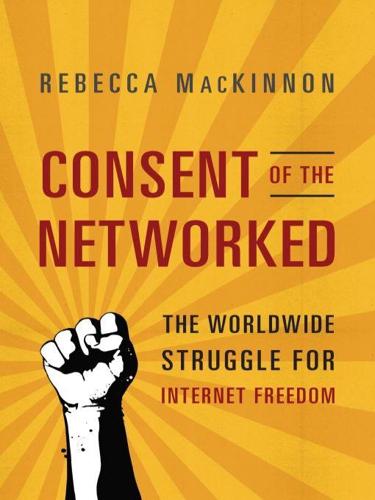
Consent of the Networked: The Worldwide Struggle for Internet Freedom
by
Rebecca MacKinnon
Published 31 Jan 2012
Earlier in the twentieth century, revolutionary attempts to create capitalism-free societies in the former Soviet Union, Eastern Europe, China, and elsewhere were rather disastrous when it came to human rights, let alone economic prosperity. Utopian ideologies such as Marxism-Leninism and Maoism produced demagoguery, totalitarianism, and genocide. In a controversial 2006 essay about what he calls “Digital Maoism,” and later in his 2010 book, You Are Not a Gadget, technologist Jaron Lanier warned of a “new online collectivism,” the digital variant of a concept that “has had dreadful consequences when thrust upon us from the extreme Right or the extreme Left in various historical periods.” Though there is much idealism and enthusiasm around the idea of the Internet being a place where the evils, hypocrisies, and general messiness of human economics, politics, and social relations can somehow be transcended, there is little evidence that human nature is any more virtuous or selfless in cyberspace than it is in the physical world.
…
Also see his most recent book, Program or Be Programmed: Ten Commands for a Digital Age (New York: OR Books, 2010). 233 “The invention of a tool doesn’t create change”: Clay Shirky, Here Comes Everybody: The Power of Organizing Without Organizations (New York: Penguin Press, 2008), 105. 233 “cute-cat theory of digital activism”: Ethan Zuckerman, “The Cute Cat Theory Talk at ETech,” My Heart’s in Accra blog, March 8, 2008, www.ethanzuckerman.com/blog/2008/03/08/the-cute-cat-theory-talk-at-etech. 234 in 2007 WITNESS launched its own Video Hub: http://hub.witness.org; Yvette Alberdingk Thijm, “Update on the Hub and WITNESS’ New Online Strategy,” August 18, 2010, http://blog.witness.org/2010/08/update-on-the-hub-and-witness-new-online-strategy; Ethan Zuckerman, “Public Spaces, Private Infrastructure—Open Video Conference,” My Heart’s in Accra blog, October 1, 2010, www.ethanzuckerman.com/blog/2010/10/01/public-spaces-private-infrastructure-open-video-conference. 234 “Protecting Yourself, Your Subjects and Your Human Rights Videos on YouTube”: http://youtube-global.blogspot.com/2010/06/protecting-yourself-your-subjects-and.html. 234 2010 Global Voices Citizen Media Summit: Sami Ben Gharbia, “GV Summit 2010 Videos: A Discussion of Content Moderation,” Global Voices Advocacy, May 7, 2010, http://advocacy.globalvoicesonline.org/2010/05/07/gv-summit-2010-videos-a-discussion-of-content-moderation; and Rebecca MacKinnon, “Human Rights Implications of Content Moderation and Account Suspension by Companies,” RConversation blog, May 14, 2010, http://rconversation.blogs.com/rconversation/2010/05/human-rights-implications.html; 235 “Digital Maoism”: Jaron Lanier, “Digital Maoism: The Hazards of the New Online Collectivism,” Edge: The Third Culture, May 30, 2006, www.edge.org/3rd_culture/lanier06/lanier06_index.html. Also see Jaron Lanier, You Are Not A Gadget: A Manifesto (New York: Random House, 2010). 238 Students for Free Culture: http://freeculture.org. 238 In 2009 Sweden’s Pirate Party won two seats in the European Parliament: Tom Sullivan, “Sweden’s Pirate Party Sets Sail for Europe,” The Christian Science Monitor, June 8, 2009, www.csmonitor.com/World/Europe/2009/0608/p06s08-woeu.html (accessed August 15, 2011). 238 green parties have taken up Internet freedom: German Green Party politician Malte Spitz, for example, has taken up the fight against surveillance and censorship as a signature issue.
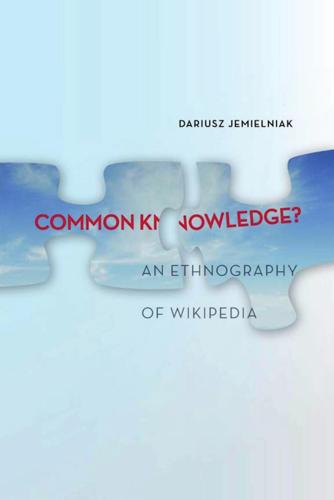
Common Knowledge?: An Ethnography of Wikipedia
by
Dariusz Jemielniak
Published 13 May 2014
When the Wikipedians talk: Network and tree structure of Wikipedia discussion pages. In Proceedings of the Fifth International Conference on Weblogs and Social Media (pp. 177–184). Menlo Park, CA: AAAI Press. Retrieved from http://www.aaai.org/ocs/index.php/ICWSM/ ICWSM11/paper/viewFile/2764/3301 Lanier, J. (2006, May 29). Digital Maoism: The hazards of the new online collectivism. The Edge. Retrieved from http://www.edge.org/3rd_culture/lanier06/lanier06 _index.html Latour, B. (1986). The powers of association. In J. Law (Ed.), Power, action and belief: A new sociology of knowledge? London: Routledge & Kegan Paul. Latour, B., & Woolgar, S. (1979). Laboratory life: The social construction of scientific facts.
…
Referent organizations and the development of inter-organizational domains. Human Relations, 36(3), 269–284. Tumlin, M., Harris, S. R., Buchanan, H., Schmidt, K., & Johnson, K. (2007). Collectivism vs. individualism in a wiki world: Librarians respond to Jaron Lanier’s essay “Digital Maoism: The hazards of the new online collectivism.” Serials Review, 33(1), 45–53. Turek, P., Wierzbicki, A., Nielek, R., Hupa, A., & Datta, A. (2010). Learning about the quality of teamwork from wikiteams. In Proceedings of the 2010 IEEE Second International Conference on Social Computing (pp. 17–24). Washington, DC: IEEE Computer Society.
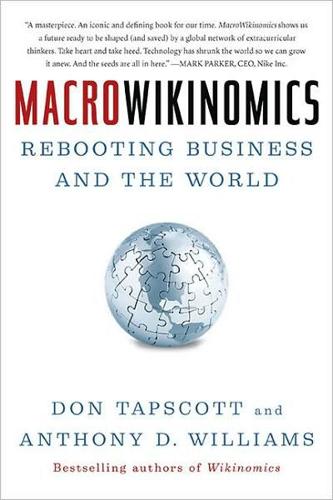
MacroWikinomics: Rebooting Business and the World
by
Don Tapscott
and
Anthony D. Williams
Published 28 Sep 2010
Wikinomics, by itself, is not a panacea or a complete recipe to fix all of the world’s ailments. It is not a wholesale replacement for good government, the corporation, professional journalism, our health care systems, or our institutions of higher learning. Nor is it an argument to replace the dynamism of capitalism with some new form of online collectivism or central planning by committee. Financial markets and corporations will remain the underlying engines of innovation, prosperity, and job creation. Governments will still collect taxes, provide social security, and enact new laws on their population’s behalf. Universities will continue to be an oasis for learning, advanced research, and free thinking, as well as a place where young people go to “grow up.”
…
Having grown up digital, “a new generation has come of age with a reduced expectation of what a person can be, and of who each person might become.”3 As a result, we behave like gadgets. We are all suffering from a “digital reification” where the basic characteristics of underlying technology algorithms are now determining how we relate to one another. In particular, Lanier seems concerned about a new form of online “collectivism” that is suffocating authentic voices in a muddled and anonymous tide of mass mediocrity. He laments the idea that the collective is all-wise and compares mass collaborations to totalitarian regimes. This collectivist mentality is led by a subculture of “Digital Maoists,” who are the “folks from the open culture, Creative Commons world, the Linux community, and the Web 2.0 people.”